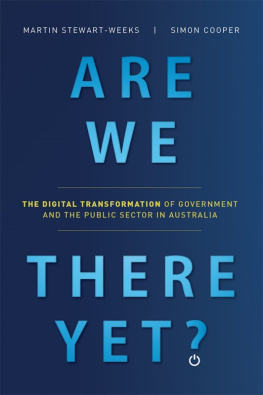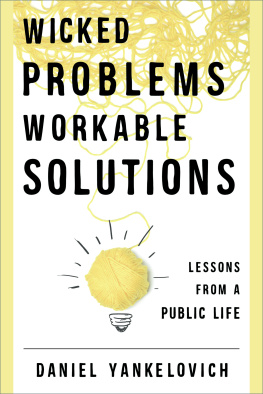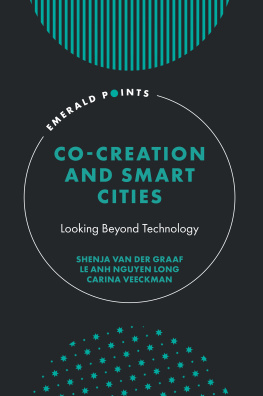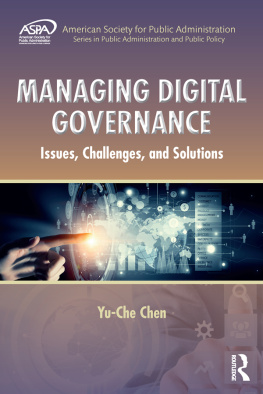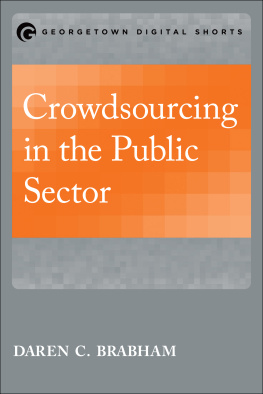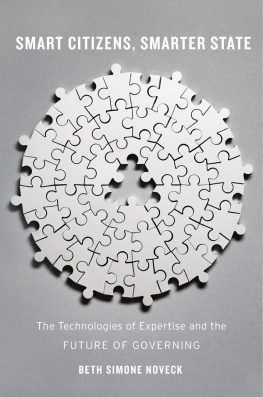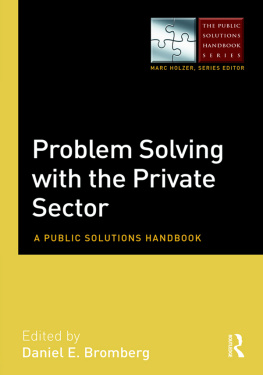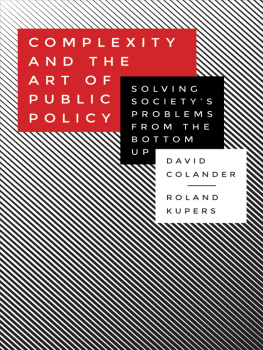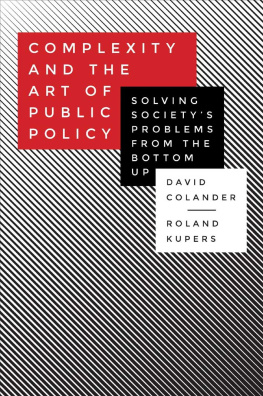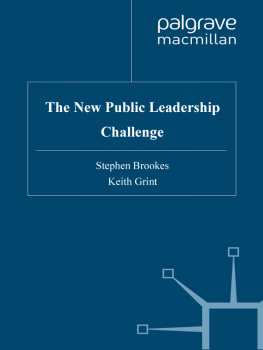SOLVING PUBLIC PROBLEMS
SOLVING
PUBLIC PROBLEMS
A Practical Guide to Fix Our Government and Change Our World
BETH SIMONE NOVECK

Copyright 2021 by Beth Simone Noveck.
All rights reserved.
This book may not be reproduced, in whole or in part, including illustrations, in any form (beyond that copying permitted by Sections 107 and 108 of the U.S. Copyright Law and except by reviewers for the public press), without written permission from the publishers.
Figures from The Governance Lab (on pages ) are licensed under Creative Commons 4.0.
Yale University Press books may be purchased in quantity for educational, business, or promotional use. For information, please e-mail (U.K. office).
Set in Scala type by Integrated Publishing Solutions.
Library of Congress Control Number: 2020951416
ISBN: 978-0-300-23015-4 (hardcover : alk. paper)
A catalogue record for this book is available from the British Library.
This paper meets the requirements of ANSI/NISO Z39.481992 (Permanence of Paper).
For Amedeo Max
AUTHORS NOTE
On January 6, 2021, a systematic, relentless campaign of grievance and falsehood, led by former President Donald Trump and stoked by members of the Republican Party in Congress and right-wing media, culminated in a violent attack on the Capitol. The incompetently planned but nonetheless deadly coup attempt counted among its leaders White supremacists, neo-Nazis, and devotees of the paranoid conspiracy theory QAnon. Yet support among Americans for the insurrection went way beyond the far-right fringe. According to YouGov about 45 percent of Republicans said they backed the attack on the Capitol, while 74 million Americans voted for Trump in 2020, despite his undisguised contempt for democratic institutions and decision-making both during the campaign and over the four years of his presidency. Watching these events, one could be forgiven for thinking that American democracy was reaching its final hours. I have written this book in the firm belief that this is not so.
The tools to solve the deepest problems of our democracy are in our own hands. Even during the past long year of COVID, when it seemed the whole world had come apart, I have seen countless examples of activists, community leaders, public servants, and changemakersmany of them young people from several countriesworking with their governments to solve real problems, and overcoming strong political disagreement as they did so. I am not alone in my optimism: in the United States, 57 percent of adults believe that Americans can find a way to solve their problems, according to Pew Research. A majority also remains staunch in its belief that government and public institutions have a major role to play in addressing our big public challenges.
The way to deal with these challenges is, first and foremost, to involve citizens in the way we solve them. That means turning more power over to ordinary people. It means transforming the way we govern ourselves.
That task is now urgent, even existential. Within a generation, trust in government has declined to historic lows. With an uptick during the pandemic, until recently only 3 percent of Americans said they can trust the government in Washington to do what is right just about always. Widening levels of inequality, stagnant wages, lack of social mobility, and a decline in life expectancy and quality have led many to feel that government is neither listening to nor working for them. The effect, says comedian Bill Maher, is that America is full of fed-up, unhappy people, who just want to break shit.
Blaming the public sector for all the ills of America would be grossly unfair. Nevertheless, too often our government is indeed sclerotic and ineffective. We suffer from what Larry Lessig, a law professor at Harvard and an activist on electoral and campaign finance reform, calls institutional corruption. Relentless media focus on demagogic personalities and the horse race between political partieson political rather than governance outcomesobscure the fact that there are far better ways to govern, and as this book shows, in hard times they are beginning to emerge.
At the height of the COVID-19 pandemic, some public institutions in this country and overseas did things differently. They collaborated across government and with external organizations. They responded to difficult problems by consulting the citizens directly affected by them and through the use of rapidly increasing quantities of data and predictive analytics. They took advantage of ordinary peoples insight, passion, and power. They showed how successful government could be at improving peoples lives if such novel ways of working were the norm.
For example, the urgency of the pandemic motivated the cities of Accra, Bahir Dar, Kampala, Kano, and Mutare, with the support of the United Nations Development Programme and The Governance Lab, to turn in 2021 to their citizens for help in tackling three big challenges: improving waste generation and management, building urban resilience in slums and informal settlements, and growing and supporting their informal economies. Asked to participate in this multi-city challenge, citizens contributed almost 300 detailed and practical proposals for solving these problems with a handful currently being chosen for implementation. Also in 2020, five cities in northern Mexico collaborated with residents in a separate multi-city challenge. These cities are now implementing citizen-designed projects to address urban mobility, post-pandemic economic relief, and the digital divide. They include a novel initiative to introduce new plantings into communal areas in Monterrey to absorb pollutants and a design for eco-friendly bike stations to reduce traffic in Hermosillo.
Examples of responsive institutionsthose working with people to solve problemsexist around the world. In Taiwan, more than 200,000 people have collaborated in crafting 26 pieces of national legislation in an initiative known as vTaiwan. They have drafted laws on telemedicine and the digital economy. VTaiwan is just one example of the burgeoning crowdlaw movement, in which legislatures are turning to the use of new technology to engage their publics in lawmaking.
Innovation in government can also be found in the United States. In the past decade, even the U.S. Federal Government has been running a little-known program to source solutions to public problems from people across and outside government. Over a hundred federal agencies have used the website Challenge.gov to tap the intelligence and expertise of ordinary citizens. Right now, the Health Resources and Services Administration is asking for help on how to increase pediatric preventive care. The Department of Energy is running a competition for college students to design and build innovative buildings powered by renewable energy.
Where institutions are using more data and tapping the experience, know-how, and wisdom of ordinary people, they are able to do extraordinary things, create effective solutions to problems, and strengthen participatory democracy. Focusing only on peoples opinions, which are often corrupted by misinformation and prejudice, can merely inflame divisions. Discovering and focusing on what people know and can do helps to overcome partisanship and produce powerful outcomes. These changes, in turn, increase peoples faith that government can be made to work for them.
Such a transformation to new ways of working will not happen by itself. The African and Mexican city leaders who ran the multi-city challenges all went through eight training sessions. In Taiwan, Audrey Tang, the nations digital minister, and a leading proponent of civil society-government collaboration, has set up a training program to educate government officials and turn them into participation officers. U.S. federal agency officials have a community of practice in which they teach one another how to design and run a challenge on Challenge.gov.
Next page

